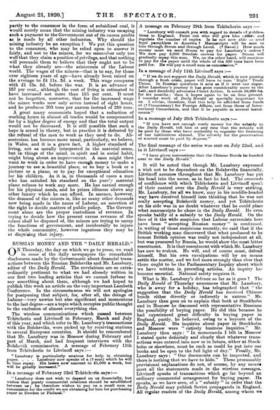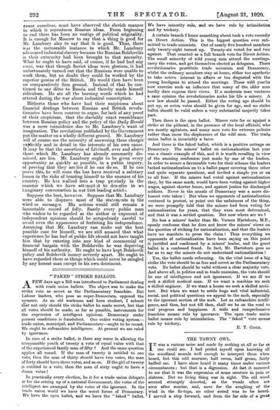RUSSIAN MONEY AND THE " DAILY HERALD." the day on
which we go to press, we read ON Thursday, in some of the daily newspapers the remarkable disclosures made by the Government about financial trans- actions between the Russian Bolsheviks and Mr. Lansbury, editor of the Daily Herald. The revelations are so extra- ordinarily pertinent to what we had already written in our first two leading articles that we cannot forbear to say something about them, although we had hoped to publish this week an article on the very important Lambeth Conference. In the circumstances we will not apologize for postponing that subject, for, after all, the doings of Labour—very unwise but also significant and momentous to the last degree—are a topic which occupies public thought to the exclusion of almost everything else.
The wireless communications which passed between Tchitcherin and Litvinoff in February, March and July of this year, and which refer to Mr. Lansbury's transactions with the Bolsheviks, were picked up by receiving stations in several European countries. It should be remembered that Mr. Lansbury was in Moscow during February and part of March, and had frequent interviews with the Bolshevik commissaries. A message of February 11th from Tchitcherin to Litvinoff says :— " Lansbury is particularly anxious for help in obtaining paper. . . Lansbury now speaks of a (? sum) which he will In time repay. His losses now amount to £1,000 a week, but will be greatly increased."
In a message of February 23rd Tchitcherin says:- "Lanabury does not wish to depend on us financially, but wishes that purely commercial relations should be established between us ; he therefore wishes to pay us a small sum as commission for the credit we are obtaining for him for purchasing paper in Sweden or Finland." A message on February 29th from Tchitcherin says :— " Lansbury will consult you with regard to details of publica- tions in England. Point out who will give him crder3 and regulate the number of copies. Is be not now able to send legal pamphlets to America ? Manuscripts will be sent to him through Strom and through LevoL (7 Revel.) How much money must we send Strom to pay for Lansbury's orders ? We now pay 2,000 Swedish crowns for paper. Strom will gradually repay this sum. We, on the other hand, will continue to pay for the paper until the whole of the 500 tons have been paid for. He will pay a small sum as commission."
In a message of July 11th Litvinoff says :- " If we do not support the Daily Herald, which is now passing through a fresh crisis, paper will have to turn ` Right Trade Union. In Russian questions it acts as if it were our organ. After Lansbury's journey it has gone considerably more to the Left., and decidedly advocates Direct Action. It needs 60,000 frs. for six months ; then it hopes again to be on firm ground. I consider work of Daily Herald as specially important for us. I advise, therefore, that this help be afforded from funds of Commissary) for Foreign Affairs, not from those of Inter- national Commission, and that it be payable in several instal- ments."
In a message of July 20th Tchitcherin says :- " If you have not enough ready money for the subsidy to the Daily Herald, tell him at any rate that the subsidy will be paid by those who have authority to organize the financing of our institutions abroad. The subsidy for the preservation of control must be paid by degrees."
The final message of the series was sent on July 22nd, and in it Litvinoff says :— "I have given instructions that the Chinese. Bonds be handed over to the Daily Herald."
It will be noted that though Mr. Lansbury expressed a wish not to be dependent on the Bolsheviks financially, Litvinoff assumes throughout that Mr. Lansbury has put his head into the noose, as in fact he had. The crescendo of confidence with which Tchitcherin and Litvinoff speak of their control over the Daily Herald is very striking. Mr. Lansbury, for all we know, may in his muddle-headed way have deceived himself into thinking that he was not really accepting Bolshevik money, and yet Tohitcherin on his side was in no doubt whatever that he could place what manuscripts he chose in the Daily Herald. He even speaks baldly of a subsidy to the Daily Herald. On the face of it the wide suspicion that Labour extremists here have been " accepting Russian money " is confirmed. In writing of these suspicions recently, we said that if the British working man discovered that what professed to be honest British opinion was really not independent at all, but was procured by Russia, he would show the most bitter resentment. It is that resentment with which Mr. Lanabury has now to reckon. He will, and of course must, defend himself. But his own exculpation will by no means settle the matter, and we feel more strongly than ever that there ought to be the Parliamentary Inquiry about which we have written in preceding articles. An inquiry has become essential. National safety requires it.
What is Mr. Lansbury's defence so far as it goes ? The Daily Herald of Thursday announces that Mr. Lansbury, who is away for a holiday, has telegraphed that " the suggestion that the Daily Herald has received Chinese bonds either directly or indirectly is untrue." Mr. Lansbury then goes on to explain that both at Stockholm and in Moscow he discussed with representative Russians the possibility of buying paper. He did this because he had experienced great difficulty in buying paper in England, partly, he believed, owing to a boycott of the Daily Herald. His inquiries about paper in Stockholm and Moscow were " entirely business inquiries." Mr. Lansbury then says : " In memoranda I left in Moscow I 'stated quite definitely and clearly that whatever trans- actions were entered into now or in future, either at Stock- holm or elsewhere, must be such as could be put into our books and be open to the full light of day." Finally, Mr. Lansbury says " Our documents can be inspected, and there is nothing that we have to hide." These presumably provisional explanations do not, of course, by any means meet all the statements made in the wireless messages. Litvinoff speaks of transactions which go far beyond. an ordinary commercial arrangement for buying paper. He speaks, as we have seen, of a " subsidy " in order that the Daily Herald may publish Soviet propaganda in England. All regular readers of the Daily Herald, among whom we count ourselves, must have observed the slavish manner in which it reproduces Russian ideas. From beginning to end there has been no vestige of political originality. It is enough for Moscow to say that a thing is good for Mr. Lansbury also to say that it is good. Thus, there was the memorable instance in which Mr. Lansbury advocated industrial slavery because the Russian Bolsheviks in their extremity had been brought to that necessity. What he ought to have said, of course, if he had had any sense, was that though Soviet ideas were glorious, it had unfortunately turned out that the Russians were unable to work them, but no doubt they could be worked by the superior genius of the British. He would then have been on comparatively firm ground. Instead of that he con- tinued to say ditto to Russia and thereby made himself ridiculous. He ate all the burning words which he had uttered during the war about industiral conscription.
Hitherto those who have had their suspicions about financial dealings between Russian and British revolu- tionaries have been content to argue, for lack of any proof of their suspicions, that the slavishly exact resemblance between Russian policy and the policy of the Daily Herald was a mere coincidence due to Mr. Lansbury's want of imagination. The revelations published by the Government put the matter on a wholly different ground. Mr. Lansbury will of course see the necessity of answering these charges explicitly and in detail in the interests of his own cause. It may be that the assertions of Litvinoff, over and above those which Mr. Lansbury has already summarily dis- missed, are lies. Mr. Lansbury ought to be given every opportunity as quickly as possible, in a public inquiry, of proving that they are lies if he can do so. If he can prove this, he will none the less have received a salutary • lesson in the risks of trusting himself to the enemies of his country. He has walked into a trap precisely in the manner which we have att-mnptd to describe in an imaginary conversation in our first leading article.
Suppose the best, however. Suppose that Mr. Lansbury were able to disprove most of the statem,mts in the wirel.ss messages. His actions would still remain a lamentable record of folly. Surely every public man who wishes to be regarded as the author or exponent of independent opinions should be scrupulously careful to. avoid even the appearanze of forfeiting his independence. Assuming that Mr. Lansbury can make out the best possible case for himself, we are still amazed that what experience he has had of public life should not have taught him that by entering into any kind of commercial or financial bargain with the Bolsheviks he was depriving himself of his authority. He ought to have kept Bolshevik policy and Bolshevik money severely apart. He ought to have regarded them as things which could never be mingled by any honest man except to his own detriment.



































 Previous page
Previous page